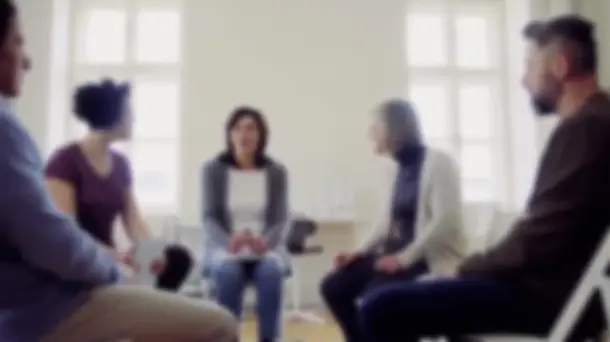Welcome to Narcotics Anonymous
What is our message? The message is that an addict, any addict, can stop using drugs, lose the desire to use, and find a new way to live. Our message is hope and the promise of freedom.

“When new members come to meetings, our sole interest is in their desire for freedom from active addiction and how we can be of help.”
It Works: How and Why, “Third Tradition”
Is NA for me?
This is a question every potential member must answer for themselves. Here are some recommended resources that may be helpful:
Need help for family or a friend?
NA meetings are run by and for addicts. If you're looking for help for a loved one, you can contact Narcotics Anonymous near you.
Subscribe to NAWS Emails
Sign up to receive Just for Today and SPAD daily meditation emails, as well as NAWS News, NAWS Updates, and more.
Never before have so many clean addicts, of their own choice and in free society, been able to meet where they please, to maintain their recovery in complete creative freedom.
Basic Text, “We Do Recover”
Recovery Quicklinks:
Service Quicklinks:
Narcotics Anonymous sprang from the Alcoholics Anonymous Program of the late 1940s, with meetings first emerging in the Los Angeles area of California, USA, in the early Fifties. The NA program started as a small US movement that has grown into one of the world's oldest and largest organizations of its type.
Today, Narcotics Anonymous is well established throughout much of the Americas, Western Europe, Australia, and New Zealand. Newly formed groups and NA communities are now scattered throughout the Indian subcontinent, Africa, East Asia, the Middle East, and Eastern Europe. Narcotics Anonymous books and information pamphlets are currently available in 49 languages.
Information About NA
Daily Meditations
Just for Today
February 22, 2026 |
God's will, or mine? |
| Page 54 |
| “We continued to take personal inventory and when we were wrong promptly admitted it.“ |
| Step Ten |
| In Narcotics Anonymous, we've found that the more we live in harmony with our Higher Power's will for us, the greater the harmony in our lives. We use the Tenth Step to help us maintain that harmony. On a daily basis, we take time to look at our behavior. Some of us measure each action with a very simple question: “God's will, or mine?” In many cases, we find that our actions have been in tune with our Higher Power's will for us, and we in turn have been in tune with the world around us. In some cases, however, we will discover inconsistencies between our behavior and our values. We've been acting on our own will, not God's, and the result has been dissonance in our lives. When we discover such inconsistencies, we admit we've been wrong and take corrective action. With greater awareness of what we believe God's will for us to be in such situations, we are less likely to repeat those actions. And we are more likely to live in greater concord with our Higher Power's will for us and with the world around us. |
| Just for Today: I wish to live in harmony with my world. Today, I will examine my actions, asking, “God's will, or mine?”
|
A Spiritual Principle a Day
February 22, 2026 |
Building Trust through Intimacy |
| Page 54 |
| “Having honest, open dialogue with our sponsor brings us to a new level of trust. As we experience intimacy in that relationship, our ability to be intimate with our partners and with others increases as well.“ |
| Living Clean, Chapter 4, “Sex” |
| It's impossible to paint all recovering addicts with the same brush when it comes to our experiences with relationships. To state that we are all permanently damaged and have never had a healthy relationship or experienced intimacy is an overstatement. What we can say is that most of us are shut down when we get to NA. We bear scars from unhealthy relationships. Many of us are certain that sustaining a romantic partnership or being the parent our kids deserve (and vice versa) are impossibilities, considering the injury and chaos we've caused. We don't want to get too close to anyone for fear of rejection. Trusting people? Being honest about our feelings? No way. If intimacy is a spiritual principle we value and a quality we want to bring to our relationships, then we need to practice it. We must surrender to learning new skills and refining existing ones: being honest, sharing feelings, owning our part, listening to and integrating feedback into our behavior, and accepting where our partner is in their growth. Ideally, the relationships we forge in NA allow us to explore intimacy in a safer environment than what we're used to–with other recovering addicts who are striving to do the same. For many of us, it's the relationship with a sponsor guiding us through the Steps that inspires us to know ourselves more intimately and to experience intimacy with others in new ways. However, this role isn't limited to our sponsor. As we start to open up, we may find multiple members we can learn to trust. We addicts may bear the scars from previous attempts at trusting others, but not all scars are permanent. |
| ——— ——— ——— ——— ——— |
| I will make today a day of healing from my past relationships. I will do this by being willing to share intimately with someone I can trust. |
Do you need help with a drug problem?
“If you’re new to NA or planning to go to a Narcotics Anonymous meeting for the first time, it might be nice to know a little bit about what happens in our meetings. The information here is meant to give you an understanding of what we do when we come together to share recovery…”
Subscribe to NAWS Emails
Sign up to receive NAWS Updates and NAWS News emails as well as Just for Today and SPAD daily emails.



